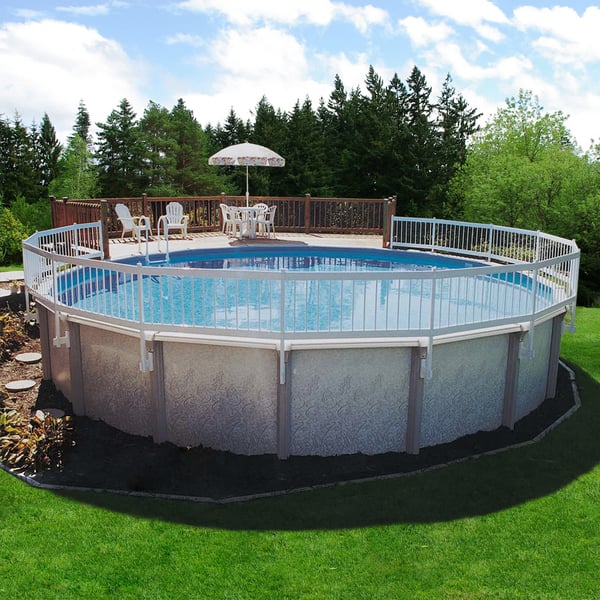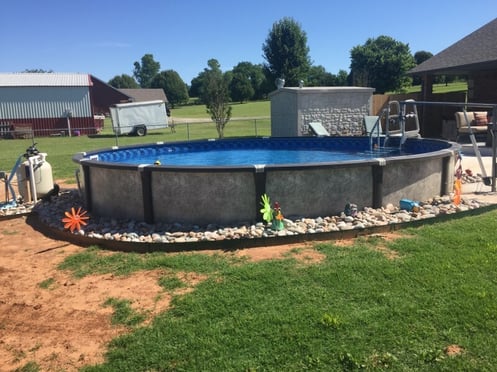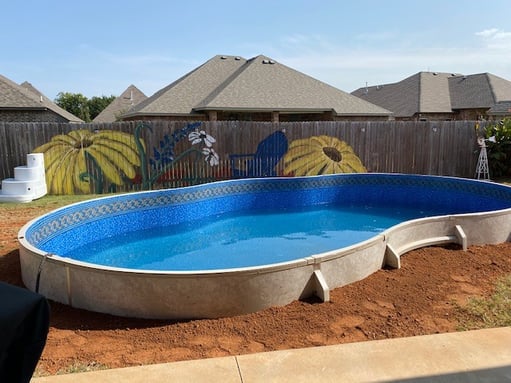“How deep can I bury this pool?” We hear this question quite often from friends, customers and folks who walk into our showroom.
Anyone who has considered an above ground pool for their home and backyard, may have considered what it would be like to bury it.
Whether it is concerns over how high off the ground the top of the pool and a deck will need to be, concerns about being seen by neighbors, aesthetic reasons, or to ensure the pool fits into existing landscaping and design of the backyard, there are a few reasons why someone would want to bury their pool, either fully or partially. In short, these are people who really want the look and feel of an inground pool, with the much lower price tag and significantly quicker install time of an above ground pool.

So, can I really bury my above ground pool?
The short answer is no, at least not all the way. Above ground pools have many amazing benefits; they are very affordable, DIY friendly and simpler to service. However, if you’re looking for a pool that can be completely buried, you should not expect to find that in a traditional above ground pool. Here are a few things to note about above ground pool kits before you try to bury them.
The walls of an above ground pool typically consist of a thin aluminum wall that holds the pool liner. The pool wall ultimately gets its strength from the pressure of the water pushing equally outward on the wall. Typical above ground pool kit walls are not made to withstand the force of the ground pressing back in on the pool. You need a much thicker pool wall to fully bury your pool.
While the installation of your above ground pool will probably require some excavation to get a level surface to assemble your pool, that excavation process is not intended to sink your above ground pool completely into the dirt. You will generally find above ground pool retailers willing to partially bury an above ground pool, but you can expect to leave at least half of the pool out of the ground.

The photo to the left is an above ground pool buried about halfway in – and as far as we can bury it. If you have a sloped yard, the installation process will be different. When our team builds an above ground or semi inground pool into a sloped yard it is a different process than digging a hole and sinking the entire pool in.
What kind of pool can I bury?
If you think you may want to bury your backyard swimming pool without the high cost of a fully inground pool, a semi-inground pool may be for you. As the name suggests, semi-inground pools can be partially buried deeper than an above ground pool. They can also be fully buried and even installed as a traditional above ground pool. Here are a few significant differences between above ground and semi-inground pools when it comes to burying.
- Construction. Semi-inground pools can be buried because the materials they are made with are different from above ground pools. Semi-inground pool kits come with a much thicker wall, for example. The wall consists of panels which are fully insulated and 2 inches thick to withstand the inward pressure of the ground. Contrast this to an above ground pool kit wall that is 1 continuous piece of aluminum formed into the pool shape.
- DIY installation is not recommended for semi-inground pools. The excavation process is more complex and must be much more precise. Of course, a deeper hole and more precision increases the cost and time required for installation of semi-inground pools. Additionally, in order to provide strength to the pool to combat ground pressure, a concrete collar will have to be added around the base of a semi-inground pool if it is buried more than 24”.
 This is a semi-inground pool. It can be buried much farther into the ground than an above ground pool.
This is a semi-inground pool. It can be buried much farther into the ground than an above ground pool.
Keep in mind that while semi-inground pools may provide homeowners with the option to partially or fully bury their above ground pool, that flexibility does come with a heftier price tag. While above ground pools cannot be fully buried, they are the most pocketbook friendly option for those looking to add a pool to their backyard in the spring or summer.









.png?width=263&name=May%20%20CL%20%20(1).png)